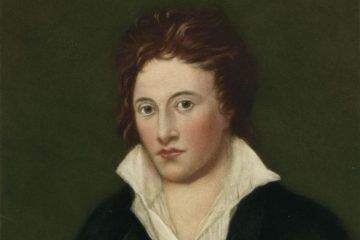Christopher Spaide at Poetry Magazine:
 One of English’s great, scornful, scorching political poems was premiered in an unassuming place: the postscript of a letter: “What a state England is in! But you will never write politics.” It was December 1819, and Percy Bysshe Shelley, then 27, was writing another pushily impassioned letter to Leigh Hunt, a poet, a radical, and the founding editor of the Examiner. Since 1818, Shelley and his wife, the novelist Mary Shelley, had been restless expatriates in Italy, never in any one city for long. Dead by drowning three years later, he never revisited his home country and never quite escaped its orbit, gravitationally tugged back by England’s tumultuous politics. However desperate for Hunt’s dispatches (“Why don’t you write to us?” the letter opens), Shelley, never afraid to speak his mind, thought his friend deserved a “scolding”: “I wish, then, that you would write a paper in the Examiner, on the actual state of the country, and what, under all the circumstances of the conflicting passions and interests of men, we are to expect.” Surely Shelley meant wish wholeheartedly, but he was also setting up Hunt for a surprise present, which he introduced, with coy calm, in his postscript. “I send you a sonnet. I do not expect you to publish it, but you may show it to whom you please.”
One of English’s great, scornful, scorching political poems was premiered in an unassuming place: the postscript of a letter: “What a state England is in! But you will never write politics.” It was December 1819, and Percy Bysshe Shelley, then 27, was writing another pushily impassioned letter to Leigh Hunt, a poet, a radical, and the founding editor of the Examiner. Since 1818, Shelley and his wife, the novelist Mary Shelley, had been restless expatriates in Italy, never in any one city for long. Dead by drowning three years later, he never revisited his home country and never quite escaped its orbit, gravitationally tugged back by England’s tumultuous politics. However desperate for Hunt’s dispatches (“Why don’t you write to us?” the letter opens), Shelley, never afraid to speak his mind, thought his friend deserved a “scolding”: “I wish, then, that you would write a paper in the Examiner, on the actual state of the country, and what, under all the circumstances of the conflicting passions and interests of men, we are to expect.” Surely Shelley meant wish wholeheartedly, but he was also setting up Hunt for a surprise present, which he introduced, with coy calm, in his postscript. “I send you a sonnet. I do not expect you to publish it, but you may show it to whom you please.”
more here.
